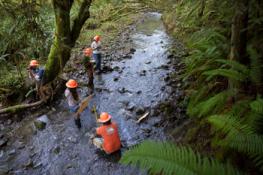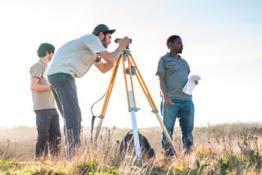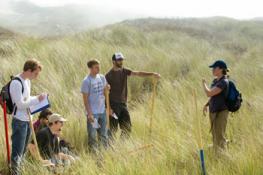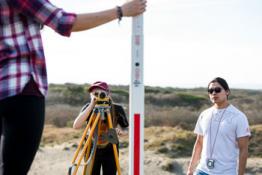Academics & Options
Understanding our environmental challenges and applying practical scientific solutions are at the heart of this major.
Our Bachelor of Science degree program focuses on restoring ecosystems, addressing energy and climate issues, and developing the skills to understand and manage the ever-changing relationship between humans and the natural world.
Learning Outcomes
This degree will teach you how to:
- apply science to understanding ecosystems and natural resources.
- understand the policy and social implications of environmental issues.
- understand, analyze, address and manage the consequences of human actions on the physical, biological, and cultural world.
- seek out the information and resources necessary to understand complex environmental issues.
- write, speak, and communicate with the public and professionals concerning the environmental sciences.
- apply critical thinking skills as the basis for decision making and sound value judgments.
Catalog Information
Concentrations
In the Environmental Science & Management undergraduate program, you’ll choose one of six concentrations. Each area offers a broad range of classes, allowing you to discover the intricate balance between people and nature
Ecological Restoration
Ecological Restoration
Ecological Restoration helps foster an understanding of environmental problems and applying practical solutions in a multi-disciplinary approach to understanding the interactions between the biological and physical world, human institutions and human behavior. This emphasis will train students in the principles and practices of ecological restoration and help students develop skills in communication, critical thinking and environmental decision-making.
The practice of ecological restoration includes a wide scope of projects including, but not limited to: erosion control, reforestation, removal of non-native species and weeds, revegetation of disturbed areas, daylighting streams, reintroduction of native species, and habitat and range improvement for targeted species.
Ecological Restoration graduates should find work with many of the same employers as students in the Policy option, including state, federal, and local governments, nonprofit environmental protection and advocacy organizations, and private consulting firms, particularly those dealing with environmental impact analysis, wetlands delineation, and of course environmental restoration and remediation projects; or go on to graduate programs in such fields as ecology, soils, watershed management, etc.
Catalog Information: Loading...
Energy & Climate
Energy & Climate
Global climate change is one of the most urgent environmental challenges of the coming century. Reducing the threat of this problem requires substantial changes in the way that modern societies produce and utilize energy resources. The Energy and Climate concentration helps foster an understanding of environmental problems by applying practical solutions in a multi-disciplinary approach to understanding the interactions between climate change, technology development, and human institutions. The Energy and Climate concentration is designed to provide students with a foundation in climate science, as well as the interdisciplinary understanding of energy technologies, economics, and policies necessary to effect change.
Work opportunities in areas related to carbon management and climate change mitigation are growing rapidly. As is true with the other options, students in the Energy and Climate option may find employment in government, nonprofit organizations, and the private sector.
Experience at the Campus Center for Appropriate Technology (CCAT) is encouraged. Headquartered on campus at the Buck House, CCAT is a live-in, working demonstration home. Included among the technologies and demonstrations are photovoltaic and wind electric systems, a solar hot water system, a greenhouse passive heating system, a composting privy, a gray water system, and organic gardens. CCAT provides one of many living labs on campus for students in the Energy and Climate option.
Students may also participate in the Green Campus Program to design and implement energy efficient projects and help lead conservation campaigns.
Catalog information: Loading...
Faculty
Kevin Fingerman, Ph.D.
Environmental Education & Interpretation
Environmental Education & Interpretation
Environmental Education & Interpretation centers on the connection made between people and natural resources. Interpretation students focus on this connection through the art and science of communication in order to inspire understanding and appreciation of the natural and cultural world. It is through understanding and appreciation that public responsibility, stewardship, and tolerance are built.
Translating the language of the scientist, the voices of the past, and the significance of places to help create meanings and connections with the people of the present.
Hands-on experiences and course work combine to prepare students to excel in their careers. Course work is broad-based and encompasses a wide range of the sciences to enable students to interpret a wide range of topics. Learning through hands-on experiences, students lead walks, conduct an outdoor environmental education program, create brochures, and design and build exhibits. Our program is designed for students to learn in the field, in the classroom, and in the lab. Throughout the program, students explore various communication strategies to meet specific goals and objectives designed to manage natural resources more effectively.
Interpretation graduates find jobs as park rangers and naturalists, environmental educators, natural resource specialists, graphic designers, and communications experts. Whether your goal is to go to graduate school or to start a career, our faculty and facilities will help you find your niche in the interpretive world. If you want to make a difference in how people see and understand the world around them, the interpretation option is for you.
Catalog information: Loading...
Faculty
Jenn L. Tarlton, M.S.
Holly M. Harvey
Environmental Planning & Policy
Environmental Planning & Policy
Balancing the needs of humans with environmental conservation
The Environmental Planning and Policy concentration focuses on how to best manage our use of natural resources today while sustaining the ecosystems they are drawn from for the future. This major offers study that centers on developing a harmonious relationship between people and the natural environment. Environmental policy-makers and planners find ways for people to live in harmony with the natural environment, satisfying our needs for space and resources while maintaining the quality of the environment.
The knowledge and skills you gain as an environmental planning major at Cal Poly Humboldt place you in high demand from employers in the natural resources and planning fields, and the uniqueness of our program will give you a competitive edge against other job applicants. Careers include everything from rural or urban land-use planning with a city or county government or a non-profit advocacy group, to environmental consulting and analysis with a state and federal land management agency or a private firm. You will only find one undergraduate-level natural resource-focused policy and planning program in the country, and it is right here at Cal Poly Humboldt.
Catalog information: Loading...
Geospatial Science
Geospatial Science
Geospatial Science allows environmental scientists and resource managers to better understand and manage challenges related to socio-environmental issues such as food, energy, public health, and natural resources, including management and conservation of wildlife, fisheries, oceans, forests, rangelands and soils, and wildland recreation resources. It does this by identifying and portraying the geographic location and various characteristics of physical and human environments, creating data layers that allow the geospatial scientist to analyze and understand the spatial relationships among those many variables. To learn more about the geospatial program at Humboldt visit gis.humboldt.edu.
Graduates will find work with many of the same employers as students in the other ESM options, including state, federal, and local governments, private environmental planning and consulting firms, and nonprofit environmental protection and advocacy organizations; or go on to graduate programs in such fields such as environmental planning, forestry, watershed management, etc.
Catalog information: Loading...
Faculty
Jim Graham, Ph.D.
David Gwenzi, Ph.D.
Buddhika Madurapperuma, Ph.D.
Nicholas Malloy, M.S.







